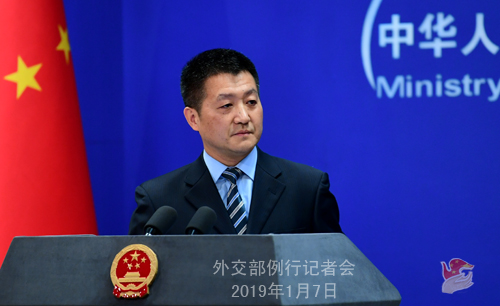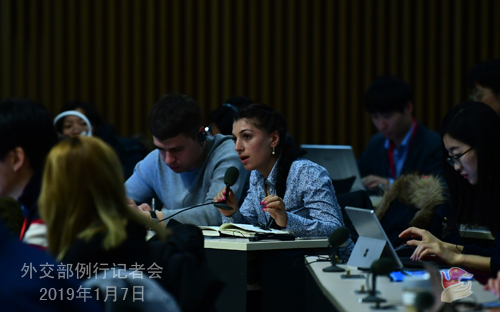| Foreign Ministry Spokesperson Lu Kang's Regular Press Conference on January 7, 2019 |
| 2019-01-07 22:51 |
|
At the invitation of President Xi Jinping, President of the Republic of Finland Sauli Niinistö will pay a state visit to China from January 13 to 16. At the invitation of President Ueli Maurer of the Swiss Confederation and Founder and Executive Chairman Klaus Schwab of the World Economic Forum, Vice President Wang Qishan will visit Switzerland and attend the World Economic Forum's 2019 Annual Meeting in Davos from January 21 to 24. Q: You just announced Vice President Wang Qishan's upcoming attendance at the WEF's 2019 Annual Meeting. Can you give us more details? As the world economy is facing greater downward pressure and risks, we hear some voices now and then that play down the world economy and the Chinese economy. So, what messages will Vice President Wang Qishan release at this year's Davos economic forum? A: According to what I know at the moment, Vice President Wang Qishan will deliver a speech at the 2019 Annual Meeting of the WEF in Davos. He will also meet with WEF Executive Chairman Schwab and exchange views with other attendees of the Forum. You mentioned that there are some external views and comments on the Chinese economy. I want to point out that our economy maintains general stability while making progress. Despite all those external uncertainties and instabilities, China's development boasts enough resilience and great potential, and the long-term positive trend of the economy will not change. We have firm confidence that the fundamentals of the Chinese economy will remain good for a long term and the Chinese economy will sustain mid- to high-speed growth and upgrade to mid- and high-end level. You may still remember President Xi Jinping's attendance and speech at the opening ceremony of the WEF Annual Meeting at the beginning of 2017 which raised China's proposal to promote world economic growth and economic globalization. President Xi's speech was positively responded and echoed internationally. This year, Vice President Wang Qishan will further elaborate on China's positions and propositions on the development of China and major international issues such as economic globalization. We welcome all parties to join hands with China in upholding the vision of consultation, cooperation and benefit for all and making positive contributions to building an open world economy and promoting the common development of mankind. Q: I have two questions. First, reports say that Vice President Wang Qishan will meet with US President Trump during the WEF's 2019 Annual Meeting in Davos. Can you confirm that? Second, there are reports saying that China-US trade talks have officially begun today. Can you confirm that? A: On your first question, at the moment I have not heard of such arrangement. On your second question, I can confirm that as agreed by China and the US, the bilateral trade talks have already started today.
Q: Can you give us more details on the progress made between China and the US on trade talks? Besides, there are reports saying that Chairman of the Xinjiang Uyghur Autonomous Region government said that UN experts are welcome to visit Xinjiang. Can you confirm this? Has the UN raised this request as well? A: On your first question, the trade talks between China and the US which got started today are still underway. I have nothing further to offer at the moment. I said last week that during the vice-ministerial level phone call between China and the US on January 4, the two sides agreed to work together to implement the important consensus reached between the two presidents on December 1, 2018 in Argentina and engage in positive and constructive dialogues on the economic and trade issues between China and the US. On your second question, Xinjiang is an open place. We welcome all parties, including UN officials, to visit Xinjiang on the condition that they abide by Chinese laws and fulfill relevant procedures. Meanwhile, all parties, including UN officials and experts, shall abide by the purposes and principles of the UN Charter and refrain from interfering in others' internal affairs or undermining others' sovereignty. They should adopt an objective and unbiased attitude and avoid buying one-sided stories or making preconceptions. We would like to remain in contact with the relevant UN agency and meet each other halfway. Q: The Myanmar police said on January 5 that four police posts in the Buthidaung area of Myanmar were attacked on January 4 by the Arakan Army, killing and injuring a few policemen. What is your comment? A: I have noted relevant reports. China supports all parties in Myanmar in advancing peace talks for reconciliation and strongly opposes all forms of violent attacks. We hope that all relevant parties could earnestly abide by the peace agreement reached not long ago, exercise restraint, strive to resolve disputes peacefully through dialogue and consultation, and move forward Myanmar's peace process. Q: US President Trump said yesterday that the weak Chinese economy gives China a good reason to want to strike a deal on trade with the US. Do you think that's an accurate statement? A: China and the United States agreed to hold positive and constructive consultations and dialogues to resolve trade disputes in accordance with the important consensus reached by the two presidents during their meeting. As for whether the trade talks are motivated by China's economic situation, we are of the opinion from the very beginning that trade frictions between China and the US will do no good to our two countries and the world economy. China is sincere about properly resolving trade frictions on the basis of mutual respect, equality, mutual benefit and reciprocity. As for whether the Chinese economy is good or not, like I said just now, China's development has enough resilience and huge potential and we are fully confident that the fundamentals of the Chinese economy will remain sound for a long term. Q: The United States sent a navy vessel on a freedom of navigation patrol today in waters near Xisha Islands. Do you have any comment on that and what do you make of the timing of this patrol as the US and China are having talks over trade issues? A: On January 7, the USS McCampbell entered China's territorial seas around Xisha Islands without permission from the Chinese side. The Chinese side immediately sent military vessel and aircraft to conduct verification and identification on the US ship and warned it to leave. We have lodged stern representations with the US side. The relevant action by the US vessel violated Chinese laws and relevant international laws, infringed upon China's sovereignty, and undermined peace, security and order of the relevant waters. The Chinese side firmly opposes the relevant action by the US side and urges the US to immediately stop such provocations. We will continue to take necessary measures to safeguard our national sovereignty and security. As for how this action will affect the current China-US trade talks, properly resolving all kind of issues between the two sides, including economic and trade issues, are beneficial to the two countries and the whole world. Both China and the US are responsible for creating the necessary positive atmosphere for this.
|
 |
|


